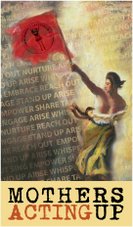 From MAU maven, Amie Nelson
From MAU maven, Amie NelsonOn my recent trip to West Africa, I was inoculated against every tropical disease the nurse could find in her book, guarded by my mosquito net fortress, and slightly comforted by the stash of remedies I had packed for possible infection, infestation and indigestion. I even brushed up on my rusty French, one of the common languages in Senegal. What I wasn’t prepared for is how women in this part of the world would seep into my soul, widen my eyes, and reconstruct some of my preconceptions of Africa – how they would give me a new blueprint for my own life as a mother and a woman.
Unlike prior world adventures as a wandering tourist, in West Africa I was a mama with a mission. In coordination with Tostan, a U.S. nonprofit dedicated to educating and empowering rural Africans, I traveled to Senegal to interview indigenous mothers who are working to raise awareness of health and human rights issues and inspiring their villages to abandon traditional practices harmful to women and girls. Tostan nominated three mother leaders for the book I’m writing so I spent ten days traveling to their small, remote villages to meet these remarkable women and learn what makes them effective advocates for change.
In a challenging and often sidetracked journey through the southern part of this rugged, beautiful country, I found myself enamored with the women of Senegal. During my short visit I soaked in their dress, customs, life philosophy and parenting styles. Up close and from a distance I observed their struggles and their ease of living. America seems determined to save Africa, but after spending time with these women, I wondered if they might have an approach that could save us.
Equality is in your head
For centuries, the mothers of West Africa have maintained an unspoken power in their communities. As the primary workers - planting crops, gathering and preparing food, transporting water, maintaining homes, raising families, and some as highly skilled artisans - they are the true life force of the village. As an unfortunate result, many young girls are not allowed to continue with their schooling because they are needed at home to help their mothers with this work. Gradually, as more women in Africa are finding their voice, they are beginning to address some of these inequities in their society.
Adriatou, a vivacious, stunning mother of five who is leading her village in the recognition of human rights and importance of education, told me with cool confidence that “equality is in your own head.” She said for many women and girls, once they understand they are competent and capable of achieving – this is what keeps their head lifted in the face on inequality and lack of opportunity.
These women do hold their heads high, carrying huge buckets of water and metal bowls containing the family’s next meal, sometimes for miles. Throughout West Africa I was awestruck by women walking the city streets or rural dirt roads all with proud, magestic strides, babies strapped to their backs, and containers cleverly balanced on their head. They have a cool confidence I have never seen anywhere. These women- these mothers, they understand their significance. The men understand too. This is why many males in the villages have embraced the changes that are taking place with the advancement of health and human rights in Senegal. They see that when their women and children thrive under more equitable conditions, the entire community benefits.
Each young
 girl I talked with during my travels in West Africa dreamed of continuing school and pursuing some type of profession. Many wanted to be teachers. Fathou, a bright-eyed 14 year old I met in The Gambia told me she wanted to study math someday. I wondered if this charming girl selling bananas at the ferry would find a way to follow her chosen path. Ame, a 12 year old street vendor in Zinginchor, a city at the southern border of Senegal and Guinea Bissau, told me she wanted to be a doctor. As the women in Africa begin to understand and reclaim their rights, their dreams may inch closer to reality in the future.
girl I talked with during my travels in West Africa dreamed of continuing school and pursuing some type of profession. Many wanted to be teachers. Fathou, a bright-eyed 14 year old I met in The Gambia told me she wanted to study math someday. I wondered if this charming girl selling bananas at the ferry would find a way to follow her chosen path. Ame, a 12 year old street vendor in Zinginchor, a city at the southern border of Senegal and Guinea Bissau, told me she wanted to be a doctor. As the women in Africa begin to understand and reclaim their rights, their dreams may inch closer to reality in the future.Amie is a Colorado MAU maven, mother of two delightful daughters and author of the forthcoming book Inspiring Mothers: Wisdom & Activism from Mothers Around the World. To read the rest of Amie’s inspiringmama blog go to www.inspiringmothers.wordpress.com
A project of Mothers Acting Up, Inspiring Mothers has a mission to engage a million mothers or more to become the new leaders of social change. To nominate a mother or receive your free report: 7 Simple Steps You Can Take Now to Change the World, visit http://www.inspiringmothers.com.
